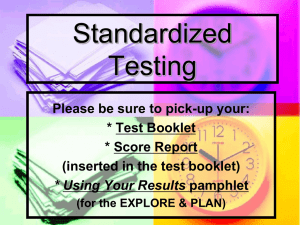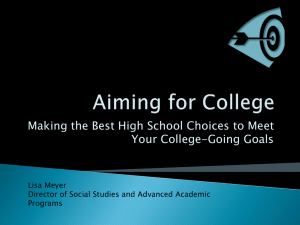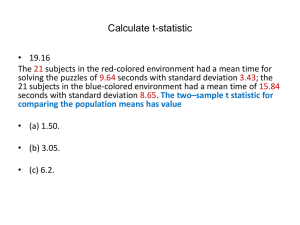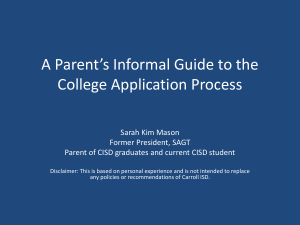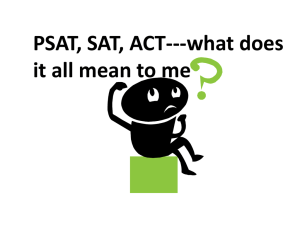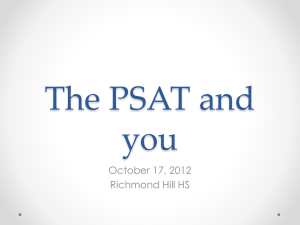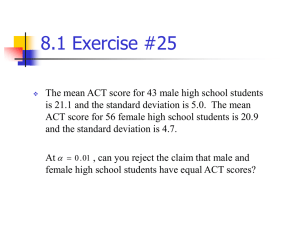Understanding Your PSAT and PLAN Results Powerpoint
advertisement
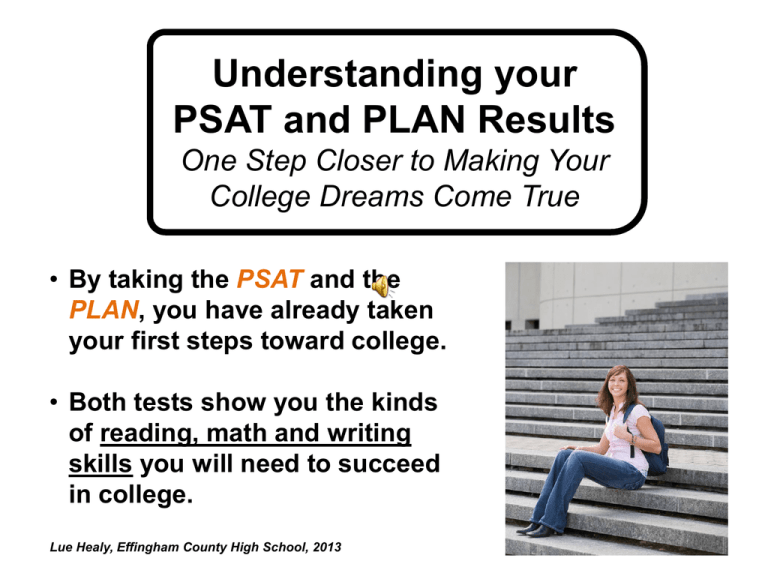
Understanding your PSAT and PLAN Results One Step Closer to Making Your College Dreams Come True • By taking the PSAT and the PLAN, you have already taken your first steps toward college. • Both tests show you the kinds of reading, math and writing skills you will need to succeed in college. Lue Healy, Effingham County High School, 2013 These are PRACTICE TESTS • • • PLAN=Practice for ACT PSAT=Practice for SAT • The PSAT and PLAN tests don’t count toward college admission because they are NOT official scores but the results DO give you feedback on the strengths and weaknesses in your education so you can start thinking about colleges, majors and careers • The tests provide preparation for the SAT and ACT: they use the same question types, format, and testing conditions as the real SAT and ACT. YES Scores from the ACT and the SAT are an important part of your college admissions applications and your scores will help determine where you will be admitted and whether you will be admitted! • A sort of pre-SAT that measures academic skills you’ll need for college and predicts a score on the SAT. • Question Types: The same, except the PSAT does not have an essay component. • Length: The PSAT is 2 hours, 10 minutes. The SAT is 3 hours, 45 minutes. • Level of Difficulty: The PSAT does not have 11th grade-level math questions. Your PSAT Score Report: • Contains information to help you improve your academic skills. • Lists skills that you have the best chance of improving with additional work. • Includes an the Online ACCESS Code at the bottom score sheet to let you access lots of valuable information. Scale: • 20-80 for each test section Averages: • 11th Graders: 47-50 • 10th Graders: 43-46 To approximate SAT Scores: Add a “0” to the end of your score! PSAT scores cannot be used for college admission! Understanding Your PSAT Results Just as in the SAT, there are Three Major Scores • Critical Reading • Mathematics • Writing Score range. If you were to take the test again many times, your predicted scores would fall in this range Score Percentile If you are a junior, your scores are compared to those of other juniors. If you are a sophomore or younger student, your scores are compared to those of sophomores. Predicted SAT Score You can see your projected SAT score online in My College QuickStart (www.collegeboard.org/quickstart). Answers Your test booklet has been returned so you can review your answers. 1st column – number of question 2nd column – correct answer 3rd column - √ means correct 0 means omitted Alphabetical letter means incorrect answer you chose 4th column – Level of difficulty E= Easy M= Medium H= Hard Student produced answers: Some math problems required you to grid in answers instead of selecting an option. For these questions, the correct answers are written in here. A sort of pre-ACT that measures the same skills you’ll need for the ACT and measures skills you will need for college too! • Question Types: The same, except the PLAN does not have an essay component. • Length: The PLAN is 1 hours, 55 minutes. The ACT is 2 hours, 55 minutes. (plus 20 more for writing section which all Georgia students should take!) • . Each of the four sections of the test are scored Math English Science Reasoning Reading Comprehension You can earn a score between 9-32 on each. The scores are averaged together to get a Composite Score Let’s take a closer look at your PLAN score The Composite score is the average of the four sections of the test – English, math, reading and science. The arrows here show the percentage of students that you scored higher than in the US and in your school on the PLAN How Ready Will I Be for College? PLAN BENCHMARK SCORES Grade 10 PLAN Benchmark Scores 10th grade students that score at or above the PLAN BENCHMARK scores are likely ON TRACK to develop the skills necessary to be a successful college student in that subject area by the time they graduate from high school. • English – 15 • Math – 19 • Reading – 17 • Science -21 Don ’t panic! Remember that you are a 10th grader and not a senior and you are developing more skills every day that will help you test more successfully! Most students will improve their scores when they test again! On the other hand, don’t allow yourself to just give up and say,“ I am a TERRIBLE test taker!” It is important to learn to be a better test taker! • • Going to college is going to involve lots of tests! Most professions and occupations depend on your performing well on a test! These include medicine, nursing, electrician, accountant, engineer, truck driver, police officer, teacher, physical therapist, veterinarian, and hundreds more fields you might choose to enter! Your getting a license in these areas depends on your passing a licensing exam! So start now learning to be a better test taker! Read! • Continuous reading improves vocabulary and develops essential skills. • Read more books than just those required for class. Take Challenging Courses! • This will help you to develop and strengthen your critical thinking skills. Take Some TIMED Practice Tests to Learn to Pace Yourself! Take the Test Seriously Every Time you Test! When you take the REAL SAT OR ACT remember these tips: • Read all of the directions. • Read all of each question’s answer choices. • Do scratch work in the test book. • PACE yourself – don’t spend too long on any one question! Knowing How and When to Guess Can Also Improve Your Future Score! ACT ??? • Always Guess! • Answer every question even if you don’t have time to get through them all, bubble something in for each question • There is NO penalty for guessing ??? SAT • There is a penalty for guessing • If you have NO idea of the answer, leave the question blank! • If you can eliminate some answers so you are choosing between three, ALWAYS guess! Focus on YOUR strengths when deciding…………. What IS the best test for me to take for college admission? SAT ACT Section score range 200-800 9-36 Test Score range 600-2400 9-36 PSAT PLAN 20-80 60-240 9-32 9-32 Section score range Test Score range Let’s compare your test scores! MY PLAN Score Find your PLAN Composite Score On your Score Sheet The student we have been using as an example made an 18 ACT Composite Score MY PSAT SCORE Add together your PSAT reading, math, and writing scores. The student we have been using as an example had scores of: 50 Critical reading 52 Math 44 Writing 146 Total PSAT score COMPARE YOUR PLAN and PSAT Scores PLAN Score 32 31 30 29 28 27 26 25 24 23 22 21 20 19 18 17 16 15 14 13 12 11 PSAT (Reading, Writing, and Math) Score 240 234 226 219 213 204 198 192 186 182 176 170 165 159 153 150 141 135 129 121 114 106 100 90 78 75 To find which test you will probably do best on, compare your total three part PSAT score to your Composite PLAN Score using this chart. Which score was higher on the chart? For example, an 18 composite on the PLAN would be lower than a 146 on the PSAT! This student should probably take the SAT! Some students don’t need to take the SAT or the ACT! COMPASS, Maybe? Technical and two year colleges You can choose to take an easier test for admission that is usually free called the COMPASS Test. Four year Colleges You must take the ACT or the SAT for admission! You cannot use the COMPASS test for admission. Moving on with your college plans…………… • YOUR PLAN and PSAT booklets and score sheets are valuable resources for helping you prepare for college admissions testing. • Keep them and use them wisely to help make your college dreams come true!

